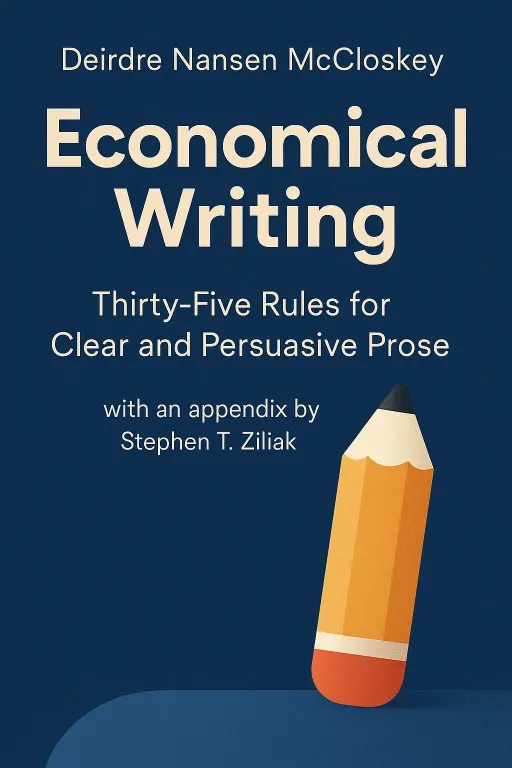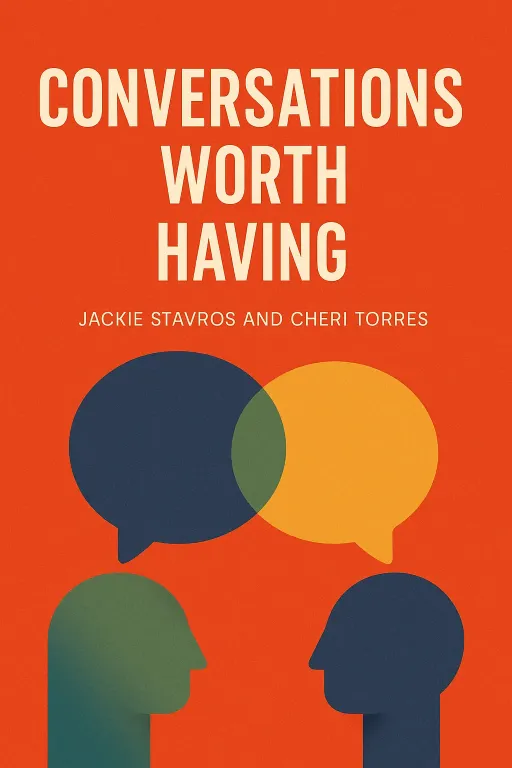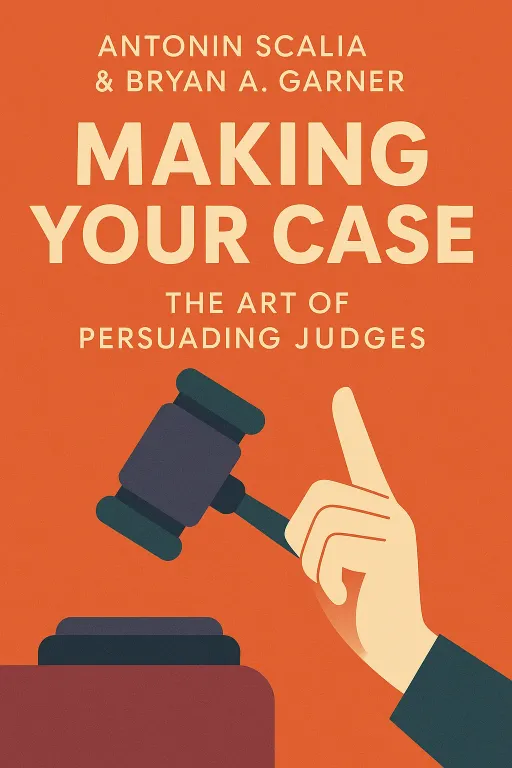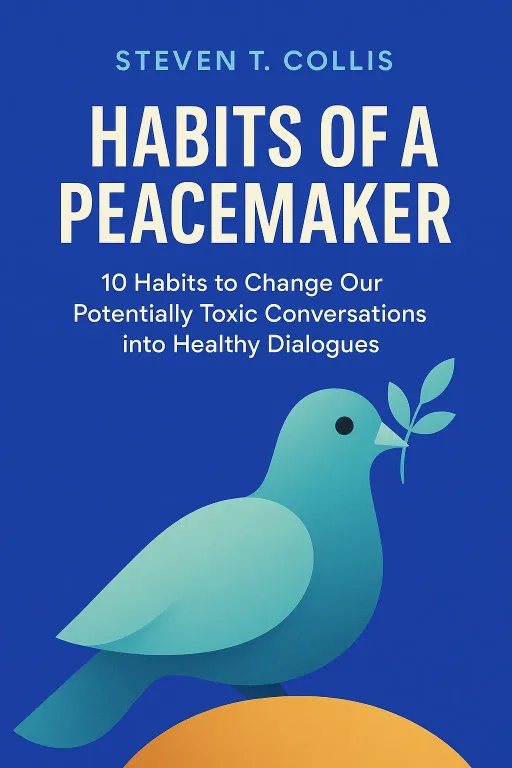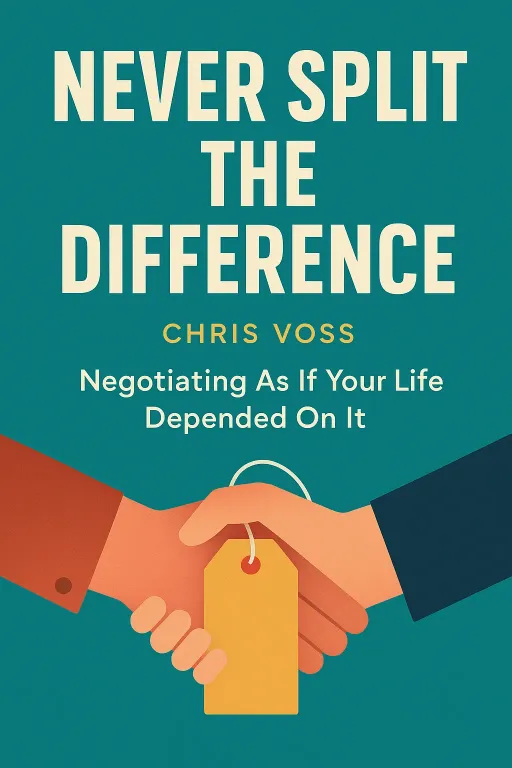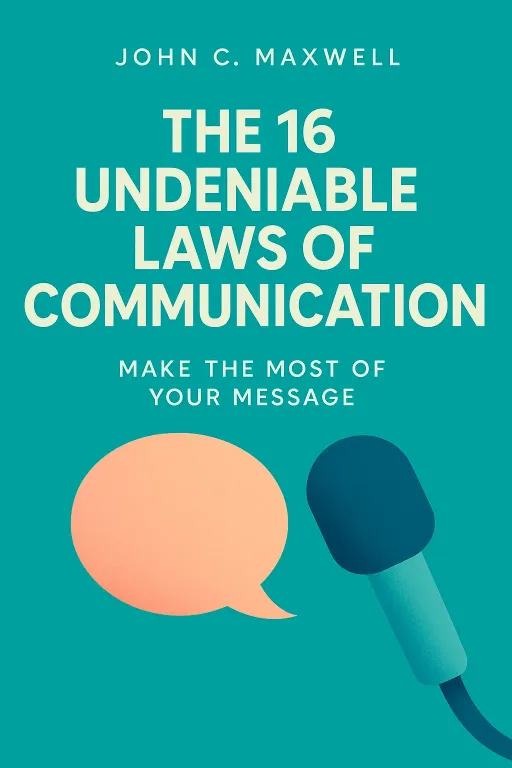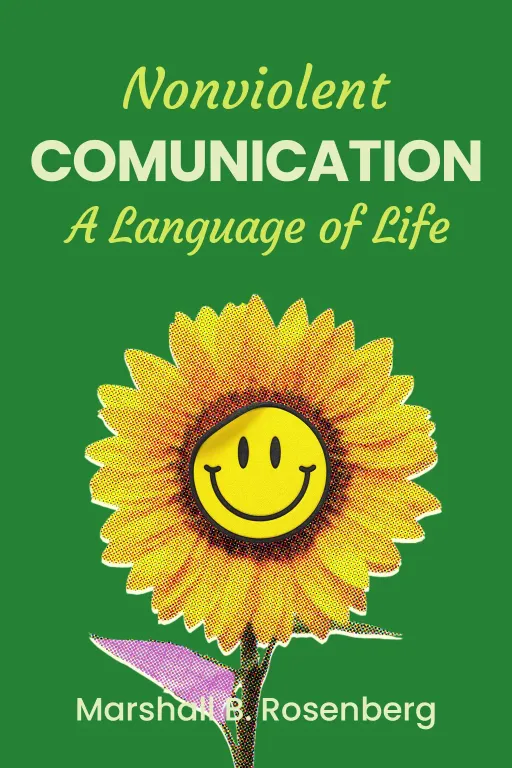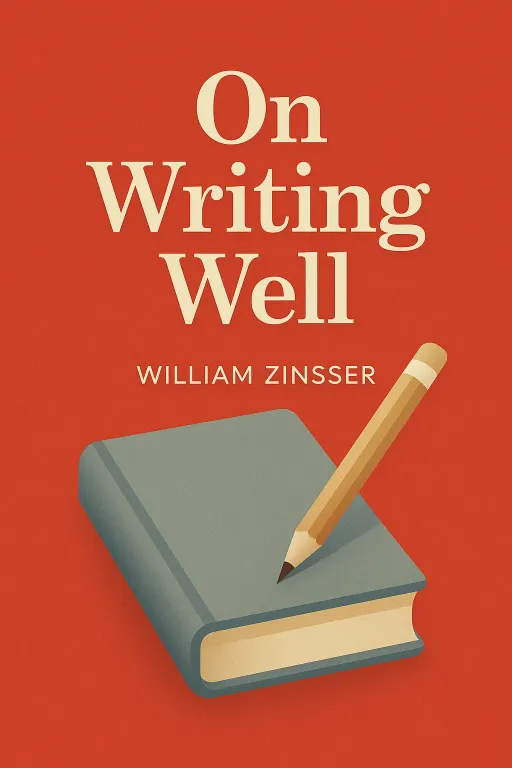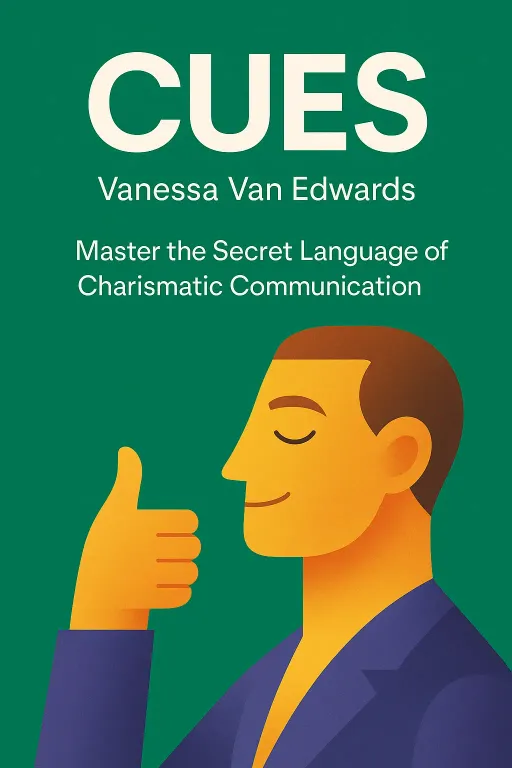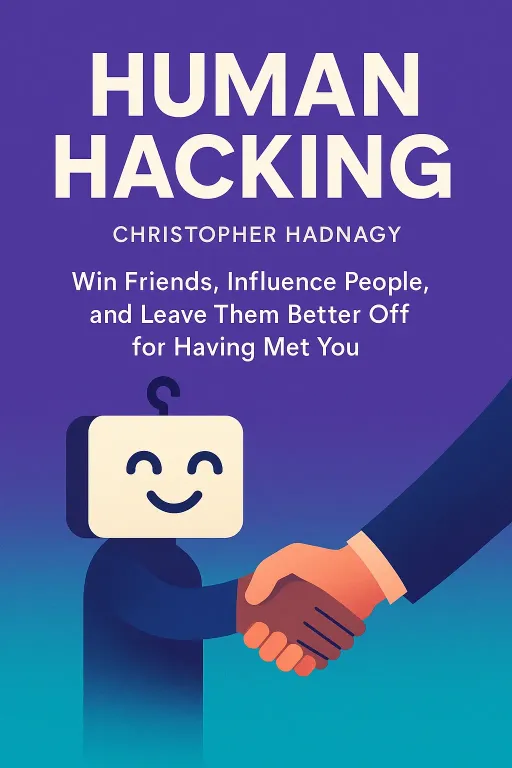
The Hacker's Guide to Connection
12 minGolden Hook & Introduction
SECTION
Michelle: Most people think of hackers as shadowy figures breaking into computers. But what if the most powerful hacking tool isn't code, but kindness? And what if the world's best hackers could teach us to be better friends, partners, and parents? Mark: That is a wild thought. You're saying the skills used to steal secrets could be the same ones we use to build trust? It sounds like a paradox. Michelle: It's the exact paradox at the heart of the book we're diving into today: Human Hacking by Christopher Hadnagy. Mark: Hadnagy… isn't he a big name in the security world? Like, the guy companies hire to literally break into their own buildings by tricking their employees? Michelle: Exactly. He's a global security expert and a pioneer in social engineering, which is the art of influencing people to bypass security systems. But this book is his fascinating pivot. He argues that in a world where we're all feeling more disconnected and socially awkward, these same skills can be used ethically to build genuine human connection. Mark: Okay, I'm intrigued and a little nervous. "Ethical human hacking" sounds like a very fine line to walk. Where do you even start with something like that?
The Ethical Pivot: Hacking for Good
SECTION
Michelle: Well, Hadnagy starts in a very serious place. Right at the beginning of the book, before he teaches you a single technique, he makes you take a pledge. Mark: A pledge? That sounds a bit dramatic. Is he trying to form a secret society of nice people? Michelle: It kind of feels that way, but for a good reason. You have to solemnly swear that you won't use these skills for selfish, one-sided gain. The core rule is that any interaction must benefit the other person too, and most importantly, you must strive to "leave people feeling better for having met you." Mark: Leave them better off for having met you. I like that. It’s a high bar, though. Does he give any examples of this in action? Because it still sounds a bit abstract. Michelle: He gives some incredible ones. My favorite is a personal story about a trip he took with his family. They were flying out of Heathrow Airport, exhausted, and stuck in economy. They get to the check-in counter, and the gate attendant is clearly having a rough day—she looks frazzled and stressed. Mark: Oh, I know that scene. That's usually when you brace for a terrible customer service experience. Michelle: Right. But instead of being demanding, Hadnagy’s wife puts human hacking into practice. She doesn't immediately ask for an upgrade. First, she just connects. She notices the attendant's makeup and scarf and gives her a genuine, specific compliment. "Your makeup is absolutely beautiful, and that scarf just pulls it all together." Mark: Okay, a simple compliment. I can see that. Michelle: The attendant’s whole demeanor changes. She visibly relaxes, smiles for the first time. A real connection is made. Only then, after a bit more friendly chat, does Hadnagy ask, "Is there any chance of an upgrade? We probably can't afford it, but I have to ask." Mark: And let me guess, she offers them extra legroom for fifty bucks. Michelle: Not even close. The attendant taps on her keyboard for a moment, looks up with a huge smile, and says, "You know what? You three have a wonderful flight." And she hands them three first-class tickets. For free. Mark: Come on. That can't be real. Just being nice gets you a thousand-dollar upgrade? That sounds too good to be true. Michelle: It does, but Hadnagy explains the psychology. It wasn't just "being nice." It was about genuine empathy. His wife correctly read the attendant's emotional state—stressed and unappreciated—and offered a moment of authentic validation. That small act of kindness and connection triggers a powerful chemical response in our brains. It releases oxytocin, the trust and generosity hormone. The attendant felt seen and valued, and her impulse was to reciprocate that positive feeling. Mark: So it's not about a transaction, it's about an emotional exchange. You make someone feel good, and they want to make you feel good in return. That’s a powerful idea. It reframes influence from something you take, to something you build together. Michelle: Precisely. And that’s the ethical foundation of the whole book. It’s not about tricking people. It’s about understanding people so you can connect with them on a real level. The first step in hacking a human is to genuinely care about them.
The Mechanics of Influence: Rapport, Pretext, and Elicitation
SECTION
Mark: Alright, I'm sold on the 'why'—who doesn't want a free upgrade or just better interactions? But what's the 'how'? It can't just be random compliments. What are the actual techniques he breaks down? Michelle: This is where it gets into the real spy-craft stuff, but for everyday life. He breaks it down into a few core tools. The first is Pretexting. Mark: Pretexting. Sounds like something from a spy movie. What is it? Michelle: It's the art of creating a believable context or a reason for an interaction. It’s the story you build that makes your presence and your questions make sense. A good pretext lowers suspicion because it answers the unconscious questions everyone has when a stranger approaches: Who are you? What do you want? Mark: So it’s like having a good excuse to talk to someone at a party, but on a much higher level. Michelle: A much, much higher level. He tells this story about a job where he had to infiltrate a super-secure warehouse. Bulletproof glass, armed guards, the works. His pretext? He posed as a sales representative from Waste Management. Mark: No way. How did he pull that off? Michelle: Meticulous preparation. He used Google Maps to identify the exact model of the trash compactor outside the facility. He got a real Waste Management uniform, a clipboard, and a fake ID badge. He walked up to security and said he was there to inspect their specific compactor model for a potential recall. Mark: That’s brilliant. He’s not just a random guy; he’s a helper. He’s there to prevent a problem for them. Michelle: Exactly. The pretext was so believable and non-threatening that security let him right in. He spent ten minutes inside, taking pictures of security flaws, and then walked out, telling the guards their compactor was fine. He left them feeling relieved and happy. That’s a perfect pretext. It’s a compelling story that makes the other person want to help you. Mark: Okay, that's pretexting. What's the next tool in the human hacker's toolkit? Michelle: The next one is even more subtle. It's called Elicitation. This is the art of getting people to give you information without ever asking for it directly. Mark: Now that really sounds like a superpower. How does that work? Michelle: It’s about creating a conversational vacuum that the other person feels compelled to fill. He gives this jaw-dropping example from a class he was teaching. The challenge was to get strangers to reveal their bank PINs. Mark: Their PINs? In public? How is that even possible, let alone legal? Michelle: Ethically, it’s a demonstration, not for malicious use. Here’s how they did it. He and a friend were in a crowded restaurant. They started a loud-ish conversation, supposedly about a news article they'd read. One says to the other, "Did you see that article? It said something like 68% of people use their birthday as their PIN. So predictable! Mine is my anniversary, 0814." The other person laughs and says, "Mine's even dumber, it's my old street address, 1337." Mark: Wait, so they're just sharing their own "secrets" out loud? Michelle: Exactly. They created a bubble of trusted confidence. It felt like a safe, casual conversation. The couple at the next table, who had been overhearing this, chimed in. The husband laughed and said, "That's nothing, mine is just 2580, straight down the keypad." Then his wife said, "Well, mine's my cat's birthday!" Even the waitress, as she walked by, added, "Mine's the year I graduated!" Mark: That is terrifying and amazing. They never once asked, "What's your PIN?" They just created a situation where sharing felt natural and low-stakes. Michelle: That's elicitation. You make the other person want to tell you. And again, Hadnagy stresses that these extreme examples are to show the power of the tool. In real life, you use this to learn about a client's needs without being pushy, or to understand what's really bothering your friend without having to interrogate them. It’s about listening and guiding a conversation.
The Dark Side and the Shield: Recognizing and Stopping Manipulation
SECTION
Mark: Okay, these tools are clearly powerful. Which makes me think... what happens when someone uses them for evil? All this talk of pretexts and elicitation sounds like the playbook for every scammer on the planet. How do we protect ourselves from the 'dark side' of human hacking? Michelle: That's the crucial final piece of the book. Hadnagy makes a very clear distinction between ethical influence and devious manipulation. Influence, in his view, is about mutual benefit. Manipulation is about tricking or forcing someone to act against their own best interests, often by hijacking their emotions. Mark: Emotional hijacking. That sounds familiar. Michelle: It's when a strong emotion—like fear, greed, or even intense empathy—short-circuits our rational brain. And manipulators are experts at triggering it. He tells this absolutely chilling story about the city treasurer of Ottawa, Canada. A woman named Marian Simulik. Mark: What happened to her? Michelle: She was a highly respected, 28-year veteran. Very diligent, very by-the-book. A scammer targeted her, knowing her personality type. The scammer sent an email impersonating her boss, the city manager. The email was perfectly crafted to appeal to her conscientious nature. It was formal, it talked about a "sensitive, private deal," and it asked her to personally handle a wire transfer for just under $100,000. Mark: And the pretext was that it was a secret deal, so she couldn't talk to anyone about it. Michelle: Precisely. It played on her sense of duty and discretion. It made her feel trusted and important. Her rational brain, which might have said "I should call my boss to verify this," was bypassed by the emotional frame of secrecy and urgency. She wired the money. Mark: Wow. So they weaponized her best quality—her diligence—against her. That's brutal. Michelle: It is. And it's a perfect example of manipulation. The scammer didn't leave her better off; they exploited her. The book has been praised for making people aware of these tactics, but it's also a point of criticism. Some argue that by teaching these techniques, even ethically, you're also creating a manual for potential manipulators. Mark: I can see that. It's a real ethical tightrope. So what's the defense? How do we build a shield against this? Michelle: The book says the best shield is awareness. First, understand these principles exist. Second, learn to recognize when your emotions are being intentionally triggered. If you suddenly feel intense pressure, fear, or an urge to act immediately, especially with money, that's a huge red flag. Mark: So, pause and breathe. Michelle: Yes. And always verify. The scam against the Ottawa treasurer was only discovered when the scammer got greedy and sent a second email asking for more money. That was the one detail that felt wrong enough to make her pause and pick up the phone. A simple phone call would have stopped the whole thing. The book's lesson is that in a world of digital deception, an old-fashioned voice-to-voice or face-to-face verification is your strongest defense.
Synthesis & Takeaways
SECTION
Mark: So when you put it all together, it's a fascinating double-edged sword. These skills can be used to build incredible connections and leave people feeling wonderful, but in the wrong hands, they can be used to cause real harm. The whole book is really a call for self-awareness, both in how we influence others and how we are influenced. Michelle: Exactly. It's not a collection of tricks. It’s a mindset. Hadnagy's ultimate message, the one he repeats over and over, is to "always—always—leave them better off for having met you." It’s a philosophy rooted in empathy. Mark: And it seems like readers have really responded to that positive framing. The book is highly rated, and people seem to appreciate this shift from the darker side of hacking to something constructive. Michelle: They have. And I think it’s because it feels so necessary right now. So the one concrete action the book suggests is to just start paying more attention. Not just to what people say, but to their non-verbal cues, to their emotional state. Are they comfortable? Are they stressed? Are they open? Mark: It’s about shifting your focus from "What do I want to say?" to "What is this person feeling?" Michelle: That’s the whole game. And it's why Hadnagy ends the book with a powerful, two-word mantra: "Empathy rocks!" So, I'll leave our listeners with a reflective question from the book's spirit: What's one small thing you could do this week to make someone you interact with feel genuinely seen and heard? Mark: A great question to end on. It’s a reminder that the most profound hacks are the ones that build things up, not tear them down. Michelle: This is Aibrary, signing off.
